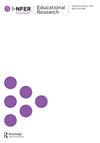Leadership practices and sustained lesson study
IF 2.6
3区 教育学
Q1 EDUCATION & EDUCATIONAL RESEARCH
引用次数: 1
Abstract
ABSTRACT Background The continual improvement of teaching and learning is vital for schools in order to meet the rapid changes in the world around us. Lesson study is considered a valuable professional development approach in that regard. It is focused on teachers collaboratively studying live classroom lessons. Sustaining lesson study, by making its core components part of the school’s organisational routines, can help schools continually and systematically to improve student learning and teaching. However, despite the value of this approach, sustaining lesson study turns out to be complex. Leadership seems to play a crucial role therein, but the question is: how? Purpose The study aimed to gain in-depth insight into what leadership looks like in schools that sustained lesson study. Method A case study design was used to investigate leadership in two secondary schools. We conducted over 300 hours of observations through immersion within practice, collected school policy documents, and interviewed the school leadership. Data were analysed qualitatively. Findings The analysis identified that both schools carried out various leadership practices for sustained lesson study. For leadership at schools that aim for sustained lesson study, it seems important to schedule lesson study, to be available, to have knowledge about lesson study and to appoint a lesson study coordinator. Whether and how leadership practices were carried out seemed to depend on the school’s context – for instance, by the policy reasons for working with lesson study. As such, it is important to examine the school and its leadership in context when considering sustainability. Conclusion Through immersion within practice, specific and real-life examples of leadership were identified. This study’s insights could help school leadership to sustain lesson study in their schools.领导力实践和持续的课程学习
为了适应当今世界的快速变化,学校的教学质量和学习质量的不断提高至关重要。在这方面,课程研究被认为是一种宝贵的专业发展方法。它的重点是教师协作学习现场课堂课程。通过使课程学习成为学校组织常规的核心组成部分,可以帮助学校持续和系统地改善学生的学习和教学。然而,尽管这种方法很有价值,但持续的课程学习却很复杂。领导力似乎在其中发挥了关键作用,但问题是:如何发挥作用?目的:本研究旨在深入了解在持续课程学习的学校中,领导力是什么样子的。方法采用个案研究设计对两所中学的领导能力进行调查。我们通过沉浸在实践中进行了300多个小时的观察,收集了学校的政策文件,并采访了学校的领导。对数据进行定性分析。分析发现,两所学校都开展了不同的领导实践,以进行持续的课程研究。对于以持续的课程研究为目标的学校的领导来说,安排课程研究,随时可用,了解课程研究并任命课程研究协调员似乎很重要。是否以及如何进行领导实践似乎取决于学校的背景-例如,根据政策原因进行课程研究。因此,在考虑可持续发展时,审视学校及其领导层是很重要的。通过沉浸在实践中,确定了领导力的具体和现实生活中的例子。本研究的见解可以帮助学校领导维持学校的课程学习。
本文章由计算机程序翻译,如有差异,请以英文原文为准。
求助全文
约1分钟内获得全文
求助全文
来源期刊

Educational Research
EDUCATION & EDUCATIONAL RESEARCH-
CiteScore
4.00
自引率
2.90%
发文量
0
期刊介绍:
Educational Research, the journal of the National Foundation for Educational Research (NFER), was established in 1958. Drawing upon research projects in universities and research centres worldwide, it is the leading international forum for informed thinking on issues of contemporary concern in education. The journal is of interest to academics, researchers and those people concerned with mediating research findings to policy makers and practitioners. Educational Research has a broad scope and contains research studies, reviews of research, discussion pieces, short reports and book reviews in all areas of the education field.
 求助内容:
求助内容: 应助结果提醒方式:
应助结果提醒方式:


